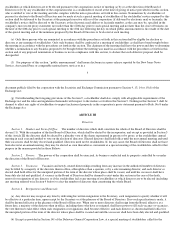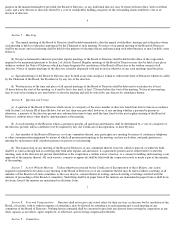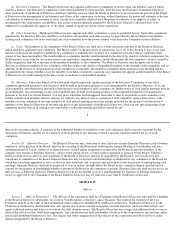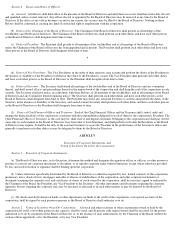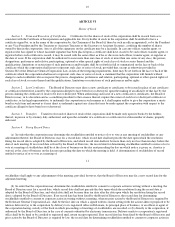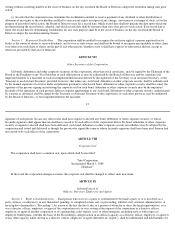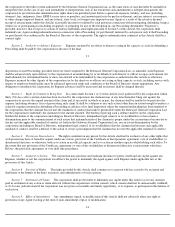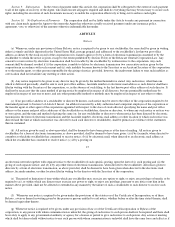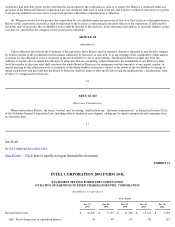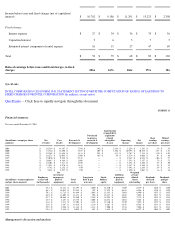Intel 2001 Annual Report Download - page 29
Download and view the complete annual report
Please find page 29 of the 2001 Intel annual report below. You can navigate through the pages in the report by either clicking on the pages listed below, or by using the keyword search tool below to find specific information within the annual report.
(a) Executive Committee : The Board of Directors may appoint an Executive Committee of not less than one member, each of whom
shall be a director. The Executive Committee, to the extent permitted by Delaware law, these Bylaws, the Executive Committee Charter or
other resolutions of the Board of Directors, shall have and may exercise when the Board of Directors is not in session all powers of the Board
of Directors in the management of the business and affairs of the corporation, including, without limitation, the power and authority to declare
a dividend or to authorize the issuance of stock, except such committee shall not have the power or authority to (a) approve or adopt, or
recommend to the corporation's stockholders, any action or matter expressly required by the Delaware General Corporation Law to be
submitted to stockholders for approval, or (b) adopt, amend or repeal any bylaw of the corporation.
(b) Other Committees : The Board of Directors may appoint such other committees as may be permitted by law. Such other committees
appointed by the Board of Directors shall have such powers and perform such duties as may be prescribed by the resolution or resolutions
creating such committee, but in no event shall any such committee have the powers denied to the Executive Committee in these Bylaws.
(c) Term : The members of all committees of the Board of Directors shall serve a term coexistent with that of the Board of Directors
which shall have appointed such committee. The Board, subject to the provisions of subsections (a) or (b) of this Section 9, may at any time
increase or decrease the number of members of a committee or terminate the existence of a committee; provided, that no committee shall
consist of less than one member. The membership of a committee member shall terminate on the date of his death or voluntary resignation, but
the Board may at any time for any reason remove any individual committee member and the Board may fill any committee vacancy created by
death, resignation, removal or increase in the number of members of the committee. The Board of Directors may designate one or more
directors as alternate members of any committee, who may replace any absent or disqualified member at any meeting of the committee, and, in
addition, in the absence or disqualification of any member of a committee, the member or members thereof present at any meeting and not
disqualified from voting, whether or not the member or members constitutes a quorum, may unanimously appoint another member of the Board
of Directors to act at the meeting in the place of any such absent or disqualified member.
(d) Meetings : Unless the Board of Directors shall otherwise provide, regular meetings of the Executive Committee or any other
committee appointed pursuant to this Section 9 shall be held at such times and places as are determined by the Board of Directors, or by any
such committee, and when notice thereof has been given to each member of such committee, no further notice of such regular meetings need be
given thereafter; special meetings of any such committee may be held at the principal office of the corporation required to be maintained
pursuant to Section 2 of Article I hereof, or at any place which has been designated from time to time by resolution of such committee or by
written consent of all members thereof, and may be called by any director who is a member of such committee, upon written notice to the
members of such committee of the time and place of such special meeting given in the manner provided for the giving of written notice to
members of the Board of Directors of the time and place of special meetings of the Board of Directors. Notice of any special meeting of any
committee may be waived in writing at any time before or after the meeting and will be waived by any
8
director by attendance thereat. A majority of the authorized number of members of any such committee shall constitute a quorum for the
transaction of business, and the act of a majority of those present at any meeting at which a quorum is present shall be the act of such
committee.
Section 10. Emeritus Director. The Board of Directors may, from time to time, elect one or more Emeritus Directors, each of whom
shall serve, at the pleasure of the Board, until the first meeting of the Board next following the Annual Meeting of Stockholders and for a
maximum period of 3 years, subject to an annual review, or until earlier resignation or removal by the Board (except that founders of the
company may remain as Emeritus Directors, subject to the annual review, or until earlier resignation or removal by the Board). Emeritus
Directors shall serve as advisors and consultants to the Board of Directors and may be appointed by the Board to serve as advisors and
consultants to committees of the Board. Emeritus Directors may be invited to attend meetings of the Board or any committee of the Board for
which they have been appointed to serve as advisors and consultants and, if present, may participate in the discussions occurring during such
meetings. Emeritus Directors shall not be permitted to vote on matters brought before the Board or any committee thereof and shall not be
counted for the purpose of determining whether a quorum of the Board or the committee is present. Emeritus Directors shall receive no fee for
their services as Emeritus Directors. Emeritus Directors will not be entitled to receive reimbursement for expenses of meeting attendance,
except as approved by the Chairman of the Board. Emeritus Directors may be removed at any time by the Board of Directors.
ARTICLE IV
Officers
Section 1. Officers Designated. The officers of the corporation shall be a Chairman of the Board of Directors who shall be a member
of the Board of Directors, a President, one or more Vice Presidents, a Secretary, and a Treasurer. The order of the seniority of the Vice
Presidents shall be in the order of their nomination, unless otherwise determined by the Board of Directors. The Board of Directors or the
Chairman of the Board or the President may also appoint one or more assistant secretaries, assistant treasurers, and such other officers and
agents with such powers and duties as it or he or she shall deem necessary. The Board of Directors may assign such additional titles to one or
more of the officers as they shall deem appropriate. Any one person may hold any number of offices of the corporation at any one time unless
specifically prohibited therefrom by law. The salaries and other compensation of the officers of the corporation shall be fixed by or in the
manner designated by the Board of Directors.










